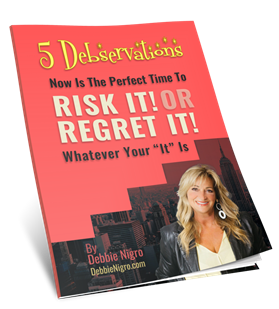Volunteer Fire Chief Rebecca Strobl Turned Her Knowledge of Life-Saving Skills into a Business to Train Others How To React In Emergencies.

I don’t know about you, but I could use a refresher course in how to do CPR, and what exactly to do first when someone’s bleeding badly, even what to do if someone is in shock.
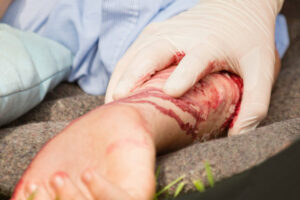
In a recent episode of The Debbie Nigro Show, I decided to shine a spotlight on Rebecca and her company New Day Education and Motivation located in Waleska, Georgia because I thought the work she was doing was critical and felt every community should have a Rebecca.

Rebecca Strobl has inspired me to go get a hands on refresher course in how to react in emergencies. Apparently I don’t own the market on being a nervous reactor when something insane happens as most people without the right skills do panic.
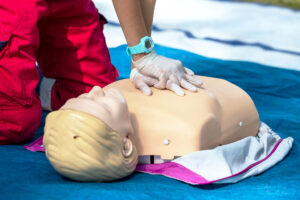
By leveraging her expertise and passion, Rebecca Strobl is making a difference one life-saving skill at a time, inspiring others to join her in creating safer and more prepared communities.
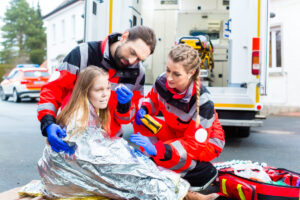
With a background as a retired volunteer fire chief and extensive experience in the security industry, Rebecca saw a need for widespread training in emergency response. Starting as a lieutenant in the fire department, she saw a gap in knowledge and took it upon herself to provide comprehensive training not only to firefighters but also to individuals in various industries.
One of the key takeaways from my conversation with Rebecca was the importance of hands-on training in emergency situations vs watching a video. Rebecca is adamant that of in-person courses matter, because participants can practice CPR, use AEDs, apply tourniquets, and learn to manage shock effectively.
There’s a big difference between simply knowing what to do and having the confidence to act decisively in critical moments especially the average person who does not have a background in using these skills on a regular basis.
Rebecca stressed the significance of being prepared for emergencies by having essential supplies on hand. She recommends items like CPR masks, tourniquets, dressings, bandages, and emergency blankets for addressing the three primary killers: lack of breathing, severe bleeding, and shock.
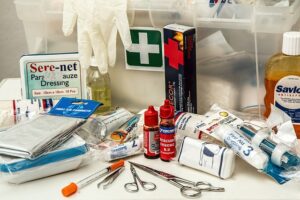

Rebecca’s passion is to empower individuals to with the knowledge to be able to save lives. Her dedication to teaching life-saving skills extends beyond traditional training methods, as she utilizes engaging and interactive techniques to ensure participants feel confident and prepared to respond in emergencies.
She is doing remarkable work and I encourage listeners to explore opportunities for training with New Day Education and Motivation if you are in the Georgia area. I encourage other communities to follow her lead in offering training for these lifesaving skills.
Rebecca’s mission to equip communities with life-saving skills is a true testament to the impact that individuals can have when they are empowered with knowledge and training.
To learn more about Rebecca Strobl and New Day Education and Motivation, visit their website at newdayeducationandmotivation.com.
You’ll get a good life-saving education in this podcast of our live conversation on The Debbie Nigro Show.
If you’d rather read than listen the transcript is below .
AUDIO TRANSCRIPT:
0:00:00
And now, back to the Debbie Nigro Show.
3
0:00:03
I got this feeling inside my bones. It goes electric, baby, when I turn it on. All through my city, all through my home. We’re flying up, no ceiling when we in our zone.
2
0:00:20
I got that sunshine in my pocket. Okay, guys, welcome to my Wellness Wednesday edition of the Debbie Nigro Show. Every city should have a Rebecca Strobl and when you meet her you’ll understand why. She’s the founder and president at New Day Education and Motivation, a retired volunteer fire chief and spent a lot of years in the sales industry as a security executive. She started a company out of the passion to teach
2
0:00:45
other people how to react and know what to do in life altering situations. And we’ve all had terrifying moments and if you haven’t, I’m sorry to say something might happen because life moves like that. Like knowing what to do, I mean if somebody needs CPR, if somebody is bleeding, if somebody in the middle of a traumatic event. So she started a company to train people to have the knowledge to know what to do and I was like wow
2
0:01:14
This is what everybody needs. Hey Rebecca. Welcome to my show. How are you? I’m doing well. Thank you so much for having me Yeah live from well, Lesko, Georgia girlfriend, right? Yes, North, Georgia
1
0:01:26
Think of the very base of the Appalachian Mountains. That’s where I’m at
2
0:01:30
Yeah, and you’re out there as a former volunteer fire chief, which I always think is an amazing thing that anybody can go in there and fight fires. And you learned a lot, I imagine, doing that in order to know how to react to emergency situations. And then when did you get this idea that everybody should be refreshed with this knowledge? Like when
1
0:01:53
did this all hit you? It really hit me when I joined the fire department and I started getting the training myself. And then I saw that there was a gap so I started getting my firefighters trained as a lieutenant of the department and then next thing you know I had the opportunity to be elected as the fire chief by all my male counterparts. I was the only female in the department that was a firefighter and they elected me and we started doing some more heavy training and then people from
1
0:02:22
surrounding communities started coming and hearing about the training or like, hey you know I’m I don’t want to be in the fire service but I want this type of training too and then word spread and I thought and then it just sort of hit me and then with my double hat in
1
0:02:48
the security world I started talking to my employees and I realized that in both
2
0:02:58
worlds there was information that I had gained in those paths and gaining certifications and licenses that I knew
1
0:02:53
that wasn’t on that journey didn’t have the same access and I’m like, well, that’s a problem. I’m going to fix it.
2
0:02:59
Yeah. Yeah. Oh, you’re so great. I’m so amazed that you were able to articulate this knowledge you have on a website and start sharing that you are trained, willing to train companies, security industry, people in construction, people in corporations, individuals with very specific knowledge.
2
0:03:17
Let’s start with cardiac arrest, okay? Anybody, any day, any time. And knowing how to perform CPR, which is short for cardiopulmonary resuscitation, and use an AED, an automated external defibrillator, can mean the difference between life and death.
2
0:03:33
So just take a minute on this, because not everybody has access to one of those addictive relators when something tragic happens. How would you suggest someone learn CPR? Take a course, go online, what do you suggest?
1
0:03:48
I highly suggest that they take a course and they take a course, I mean ideally with me, my mannequins, Fred and George do travel, but you need to take a course in person so that that way you’re tested and you actually do the compressions and go through the motions because I can tell you in EMS and in the fire service, the classes I took until I actually was forced to apply the
1
0:04:23
knowledge as I heard, it didn’t stick and in an emergency situation, your brain
2
0:04:34
goes to mush and whatever you actually did, that’s what your brain is
1
0:04:25
So if you don’t put anything in the bank account and actually do it beforehand, when you go to withdraw, there’s not going to be anything there.
2
0:04:33
Does everybody’s brain go to mush? It seems to me, because I know I’m not good in an emergency. I mean, I panic. I mean, I’ll figure it out. But it seems like all my faculties are not sharp. It’s like, wow, I wish I was better at that.
2
0:04:45
Is that a typical reaction from most people when like some emergency happens?
1
0:04:49
Yeah, typically. Some people may be calmer in other situations but usually it’s because they’ve had some kind of training to do that. So there are people that are calm but that’s not the majority of what I’ve
2
0:05:01
seen. Yeah, and even with a cut, you know, you’re talking about how accidents happen where severe bleeding happens, right? I had a silly stupid thing where I hurt myself, had two little grandkids, I’m the one bleeding, I was like, I know I need a tourniquet and it was a garbage bag. So I used that. I mean, until the neighbor came and helped me. But I mean, it was a bad situation. And I would have to try and collect myself. And accidents happen to a lot of people. Knowing how to apply pressure, use tourniquets, pack wounds, these are things you teach people, right?
2
0:05:30
That can prevent somebody from bleeding to death?
1
0:05:32
Absolutely. And I do it in a really fun way. A really fun way.
2
0:05:38
Okay, I’m all ears. How do you do it? What do you play music?
4
0:05:42
What can be fun about this?
1
0:05:44
I should buy stock in a ketchup company for sure.
2
0:05:47
Oh, that’s funny.
1
0:05:48
I like to make it real and I’m the type of person where, you know, I put on the tourniquet for real. So, I mean, my whole arm will start turning blue, I take off the jewelry, purple, I’ll turn all kinds of colors just to show people like this is how it’s supposed to be. So my thinking is, is you know, hey, it doesn’t matter if you know, if I have, you know, a little, I might have some of my fingers that might not in a hundred percent, that’s okay because if somebody leaves my class and now knows exactly how to apply to tourniquet and feels confident, then I’ve accomplished my purpose.
2
0:06:20
Yeah, man, this is like really important conversation because like you said, if the knowledge is not in the bank before the moment happens, then it’s not there to draw from. Like what happens, for example, in a car accident, right? When there’s shock or a big horrible incident somewhere where there’s people have experienced physical trauma or they’re overwhelmed.
2
0:06:38
You even offer strategies to companies and train people to recognize and manage shock effectively. And I think that’s incredible.
5
0:06:46
Absolutely, yeah.
1
0:06:47
If physical shock, as far as they’ve had, like you said, they’ve been in a car accident and they have a massive bleed and their life is literally hanging in the balance. But also there’s what they call psychogenic shock. So that could come from an emotional situation where you are in a situation and your brain perceives it as just as urgent emergency as if you had your leg cut off.
1
0:07:15
But whatever that emotional, that stressful situation that you’re in, your brain is like, oh my God, we’re in bad trouble. And it can actually put your body into shock. So we talk about strategies, that’s more the corporate side. Like how can you deal with that? How can you set yourself up for success?
1
0:07:31
And what’s causing your brain to perceive that whatever situation you’re in, why is your brain perceiving that it’s life and death?
2
0:07:40
You know, I’m sorry you’re so far away in Georgia, because I know that everywhere in the country could use a you and training that you give as somebody who’s had hands-on training. But there are things in everybody’s community, and you make a really big point, and you and I talked about this briefly. I said, why don’t you take all that you’re doing and put it into videos and people can watch it?” And you said, well, it’s just not the same.
1
0:08:05
No, it’s not the same. It’s like they need to have that in-person interaction and you need to be able to do that and you need that real-time feedback.
2
0:08:15
Does every fire department, every volunteer fire department in the country have people like you with this knowledge who should be doing this?
1
0:08:23
A lot of fire departments do have, they might go through a health and safety institute that I teach through or they might go through the American Heart Association or Red Cross to be a CPR instructor. So not everybody has that. Now I’m a little biased to say that they’re going to do it exactly the way I do it, not so much, but every community does have people that teach CPR.
1
0:08:46
So it is definitely important to learn.
2
0:08:48
Yeah, really. So, you know, I love your point of this, which is, you know, live to enjoy another day and let us teach you how to make sure that you’re alive for that. And I love your passion, right, and passion. What should the average person have in their home or in their car or on them so that they’re kind of prepared without lugging, you know, tons of stuff around.
2
0:09:14
What are some basic things everybody should have?
1
0:09:17
Well, when I teach my classes and I do talk with people, we always talk about the three killers. The three things that are going to kill you the fastest. You’re not breathing, you’re bleeding, and shock. So, I always tell people, make sure you have things in your home and in your car that can address those. So not breathing, take
1
0:09:41
a CPR class and have a either a CPR mask or a barrier like I give people in my classes so that that way if somebody’s not breathing, you can use that to give them breath and to breathe for them. Also again take that CPR class so you know how to open their airway. have multiple tourniquets so that that way if you find yourself in a bad car accident make sure you have multiple tourniquets in there handy so that you can apply it to yourself or your loved ones. And then plenty of dressings and
1
0:10:15
bandages even ace bandages to basically use that to stop bleeding. And then the third thing is emergency blankets. Have plenty of those or regular blankets to treat for shock.
2
0:10:28
Okay, so my full trunk is not terrible after all. I mean, you know, I got a lot of things in there. I mean, could tie a few sweaters around people, so that would work. But, you know, it gets almost, you almost get chest pains talking about this stuff. How many people are nervous even talking about this that you’ve seen in your travels?
1
0:10:47
Some people are definitely nervous. I think a great story that just recently, one of my clients is I work with Racetrack here in Atlanta with their corporate safety team and we just did another round of CPR first aid AED training certification for them and they had one employee that came up to me after the class was over, giving me a huge hug, just so excited and she told me, you know what? She’s like, you’ve taken me out of the fear zone And I’m like great tell me more
1
0:11:18
But she’s like you took me out of the fear zone because up to this point I’ve always been fearful of what to do I’ve been the person that just like you said in class just froze because I was so afraid of What to do or what to not to do and she’s like you took me out of that zone and now I feel I can help people.
2
0:11:39
Awesome. You know, Rebecca, there’s a person that I was an early champion of who invented a life-saving choking device called LifeVac. Do you know about that?
1
0:11:54
Not 100%. I know that there’s been other devices created, but tell me more.
2
0:12:00
Well it’s something that has saved a lot of lives and he’s very he’s passionate like you are about you know Saving lives and he’s made like a thousand lives children Elderly people whoever was choking and it’s a little device I just thought you should know about it and you know should maybe have one of those as part of your you know toolbox Just because you know, I like to make matches between people I think and help one another so I’m going to send you a little Information on that, you know, that’s another big fear people get caught choking or someone’s choking
2
0:12:24
and what do you do about it when the CPR or the three thrusts don’t work. So there you go. Just wanted to point that out. Now look, your background is pretty darn amazing for this sort of thing. So I know you have a very big professional background beyond emergency services.
2
0:12:43
Just tell us what you did for two decades before you got to this.
5
0:12:47
Sure.
1
0:12:48
So I actually worked in the physical security space and I’m actually still have a toe in that space. I’m the chairwoman of the ASIS International Metro Atlanta Post. It’s basically every industry has their association or organization that is their mouthpiece
1
0:13:05
and in security, that would be ASIS International. So how I got into this industry over 20 years ago is really I was needing a job because the marble company that I was working at selling tombstones and mausoleums, thatís how I figured out I was actually good at sales. Prior to that, I was on a path of nursing. I had worked as a certified nursing assistant.
1
0:13:32
My husband and I moved to Georgia because he went to school here to be a chiropractor, loved the state, and I was working as a sales assistant to an executive at a marble company. One day he walks in, cool story, one day he walks in with a bunch of marble samples that had come out of the quarry, some magazines, and he’s like, I’m going to these so many funeral homes and these cemeteries and I need this many tombstones and mausoleum souls before I get there.
2
0:14:01
And then what happened? You say goodbye?
1
0:14:05
No, basically I figured it out. I sold so many that the plant started complaining they couldn’t keep up and then a light bulb came on and I’m like, I’m good at sales.
2
0:14:14
All right, we’ve got to end here, but boy, you’re a cutie and so full of life and energy. I’m so happy to shine a light on you, Rebecca Strobel. Check out our website, newdayeducationandmotivation.com. I think everybody who has the desire to help others during emergencies should look at what she’s doing, maybe work with her to get some training yourself and start it in your own area of the world.
2
0:14:32
Her company again is New Day Education and Motivation. And you sure motivated me today, Rebecca. Woo! Yes! Mission accomplished!
4
0:14:40
Mission accomplished. Chief Rebecca Strobl.
2
0:14:42
I would have made you chief too, fire chief. You’re just too good. All right. Wonderful meeting you. Wonderful meeting you too. Have a great rest of your day.
2
0:14:54
Go forth and keep up doing the great work you’re doing. It’s amazing. It’s amazing.
1
0:14:57
Thank you so much.
Transcribed with Cockatoo


